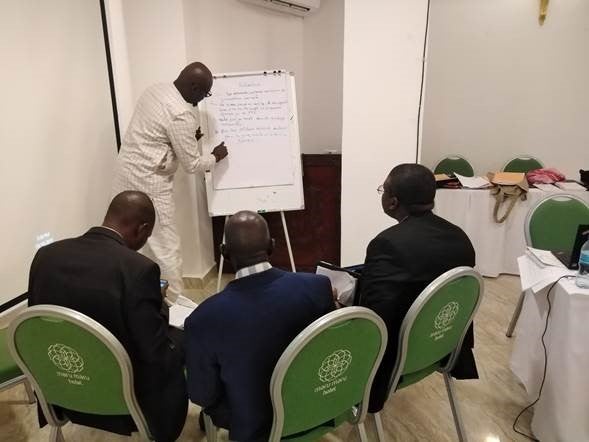
Zanzibar 6 November 2019—Twenty-five experts from seven African countries gathered in Zanzibar in the last week of October for cross-learning on rural-urban linkages.
The Expert Group Meeting (EGM) brought together national/sub-national project teams from each project country (Tanzania, Cameroon, Guinea-Conakry and Nigeria) and selected international experts from FAO and the Latin American Center for Rural Development (Rimisp). In his welcoming remarks, Dr. Iddi H. Hassan, Executive Secretary, Commission for Lands of the Government of Zanzibar, Tanzania underscored the importance of the project regarding sustainable development of Zanzibar and in other participating countries. He also acknowledged the role of the EGM in streamlining competences and knowledge on localizing URL tools and methodologies in Africa. He encouraged participants to utilize the opportunity to understand the Urban-Rural Linkages: Guiding Principles and framework of action as they are applied in the practical work of their respective countries.
The meeting served as an opportunity for countries to present the urban-rural linkages and URL-GP development process in the context of the UNDA project. Furthermore, it was discussed how to incorporate URLs in the work of territorial policies linked to urban and rural areas. Country representatives highlighted topics such as demographic trends, challenges, opportunities, mechanisms and policy vehicles to strengthen urban rural linkages. The UN-Habitat URL-GP Project Team presented the current progress on an implementation plan, including normative work and tools for applying the URL-GP at national or subnational levels.
Country teams successfully linked their URL priorities to the URL Guiding Principles. The challenges in identifying approaches of understanding the dynamic flows and interactions between more rural and more urban areas were also acknowledged. These challenges emerged from selected experiences that are important to improving approaches in collecting data from rural-urban territories. An emerging priority for the application of the URL-GP and the Rimisp methodology is to characterize “functional territories” linking small towns, intermediate cities, larger cities and rural areas which has been an important contribution.
Countries worked in groups to discuss the challenges in identifying the critical flows of people, goods, information and waste (defining urban-rural linkages) between a selected larger urban center and a smaller town or rural center based on their respective contexts. From this exercise, one key challenge was selected for each territorial context that may hinder the strengthening of URLs. The key challenge for each country was then linked to relevant provisions of the URL-GP Framework for Action. Following this exercise, the key capacity gaps (including participation of key actors) were identified related to the primary challenge for improving URLs in the given territorial context.
Country teams identified policy arenas to address both the challenges and the perceived gaps such key infrastructure needs (e.g. transport, ICT and electrification, etc.) and inadequate service provisions (e.g. water, sanitation, health, etc.). Following the workshop, all countries agreed on their data collection, stakeholder engagement and roadmaps for future work to continue to improve urban-rural linkages in each UNDA country process that are related to selected priority challenges and approaches.
The EGM served to refine tools and capacity building programs to implement the recently launched Urban-Rural Linkages Guiding Principles (URL-GP) and Framework for Action to Advance Integrated Territorial Development. Participants left with the confidence that the improved learning materials will support countries’ efforts to integrate Urban-Rural Linkages in existing or newly formulated policies, integrate them into regional and territorial development strategies and plans, and consider cross-cutting issues such as human rights, rural-urban migration, climate change, youth and gender, among other challenges. The EGM was an opportunity to prepare for the upcoming first International Forum on Urban-Rural Linkages (IFURL) which will be held 10th to 14th November, 2019, the World Urban Forum (WUF 10) from 8th to 13th February, 2020, as well as develop training programs and a platform to access information on select topics that will help meet capacity development needs in Africa and other regions.
The EGM was the continuation of the UN Development Account (UNDA) funded project “Leaving No One and No Place Behind – Strengthening Urban-Rural Linkages in Africa,”.
